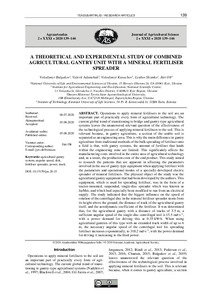Please use this identifier to cite or link to this item:
http://elar.tsatu.edu.ua/handle/123456789/13056Full metadata record
| DC Field | Value | Language |
|---|---|---|
| dc.contributor.author | Bulgakov, V. | - |
| dc.contributor.author | Adamchuk, V. | - |
| dc.contributor.author | Kuvachov, Volodymyr | - |
| dc.contributor.author | Кувачов, Володимир Петрович | - |
| dc.contributor.author | Кувачев, Владимир Петрович | - |
| dc.contributor.author | Shymko, L. | - |
| dc.contributor.author | Olt, J. | - |
| dc.date.accessioned | 2021-02-15T08:24:35Z | - |
| dc.date.available | 2021-02-15T08:24:35Z | - |
| dc.date.issued | 2020 | - |
| dc.identifier.uri | http://elar.tsatu.edu.ua/handle/123456789/13056 | - |
| dc.description.abstract | Operations to apply mineral fertilisers to the soil are an important part of practically every form of agricultural technology. The current global trend of transitioning to bridge and gantry-type agricultural systems leaves the unanswered relevant question of the effectiveness of the technological process of applying mineral fertilisers to the soil. This is relevant because, in gantry agriculture, a section of the arable soil is separated as an engineering area. This is why the main difference in gantry agriculture from traditional methods of the bulk spreading of fertiliser onto a field is that, with gantry systems, the amount of fertiliser that lands within the engineering zone are limited. This significantly affects the manufacturing costs involved in the entire area of agricultural technology and, as a result, the production costs of the end product. This study aimed to research the patterns that are apparent in affecting the parameters involved in the use of gantry-type equipment when applying fertiliser with the parameters and operational modes of a specially-developed electric spreader of mineral fertilisers. The physical object of the study was the agricultural gantry equipment that had been developed by the authors. This equipment, which is used for spreading fertiliser, was in the form of a tractor-mounted, suspended, single-disc spreader which was known as JarMet, and which had especially been modified to run from an electrical supply. The study indicated that the biggest influence on the speed of rotation of the centrifugal disc in the mineral fertiliser spreader stems from its height above the ground, the distance of track of the agricultural gantry itself, and the aerodynamic coefficient of the fertiliser. It was determined that, for the agricultural gantry with a distance of tracks of 3.5 m, a sufficient angular speed of the single-disc centrifugal tool is 15.5 rad·s−1, with a power demand for driving this at 0.35 kW·h. When using agricultural gantries of this type with an extended track width of up to 6 m, the necessary angular speed of the centrifugal tool for spreading fertiliser increases exponentially, to 318.2 rad·s−1, with the power demand for driving it increasing to the third power. | uk |
| dc.language.iso | en | uk |
| dc.relation.ispartofseries | Agraarteadus: Journal of Agricultural Science;№ 2 XXXI (Р. 139–1460 | - |
| dc.subject | agricultural gantry system | uk |
| dc.subject | angular speed | uk |
| dc.subject | disk | uk |
| dc.subject | fertiliser spreader | uk |
| dc.subject | power | uk |
| dc.subject | track | uk |
| dc.title | A theoretical and experimental study of combined agricultural gantry unit with a mineral fertiliser spreader | uk |
| dc.type | Article | uk |
| Appears in Collections: | Кафедра Експлуатації та технічного сервісу машин | |
Files in This Item:
| File | Description | Size | Format | |
|---|---|---|---|---|
| 18 AGRAARTEADUS.pdf | 1.22 MB | Adobe PDF |  View/Open |
Show simple item record
CORE Recommender
???jsp.display-item.check???
Items in DSpace are protected by copyright, with all rights reserved, unless otherwise indicated.
